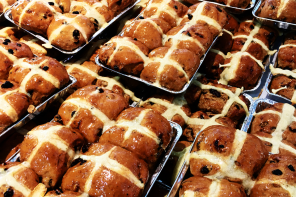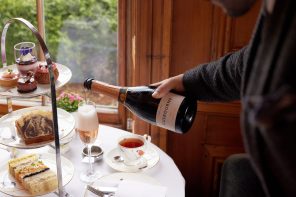Extract from 'All Day Cocktails' by Shaun Byrne and Nick Tesar.
The non-alcoholic version of the infamous brunch staple. One of the funniest things I have seen in recent times is the lengths some venues will go to when it comes to garnishing their mary variations. These garnishes have ranged from the usual suspects of celery and cucumber to extravagant fried chicken and sliders. This book simply isn’t long enough to list all the ‘inspirational’ ideas people have come up with over the years, but I encourage you to have a look on the internet (or the opposite page!) for inspiration. This recipe does not contain alcohol, but if you do need a little hair of the dog, 30 ml (1 fl oz) sweet vermouth will do just fine.
- 120 ml Passata (see below)
- 30 ml (4 fl oz) fresh orange juice
- 15 ml (½ fl oz) verjus (see note below)
- pinch of smoked paprika salt and pepper, to taste ice cubes, to serve
- Basil oil (page 165), to float
Combine all the ingredients except the oil and ice in a highball glass, then season to taste.
Top with ice, stirring to combine and chill. Float as much oil on the top as you like. Go crazy with your garnish and take a selfie with your creation.
Passata
Passata is, essentially, just tomatoes that have been cooked down to liquid form. Every summer at Gin Palace, we would make large batches and bottle it up into individual portions, forty or fifty serves at a time.
Personally, I much prefer passata-making as a family activity – a point in summer when you get everyone together to form a production line and churn out a year’s supply of future pasta sauces.
MAKES APPROX. 800 ML (27 FL OZ)
- 1.5 kg (3 lb 5 oz) tomatoes
- 10 g (¼ oz) bird’s eye chilli
- 20 g (¾ oz) sea salt
Combine all the ingredients in a saucepan and blitz with a hand-held blender until smoothish. Bring to the boil, then simmer for 1 hour.
Strain through a chinoise, pushing as much pulp through as you can. Transfer to a sterilised glass bottle (see page 15).
Ask for second-grade tomatoes, which usually come with a few blemishes but are often riper.
If making larger quantities, sterilise bottles and fill them while the passata is hot. Seal and put aside to last the year.
Verjus
This is something I have never made, which is a bit embarrassing, as I have quite a lot of access to grapes. Verjus is essentially unripe grape juice. It acts as a very light vinegar and is wonderful in beverages. Nick and I are quite fond of it as you will no doubt notice in this book. You can get white verjus, red verjus and even the named grape variety for the more premium ones. Buy a couple, experiment, find your favourite, and then look for some more.







